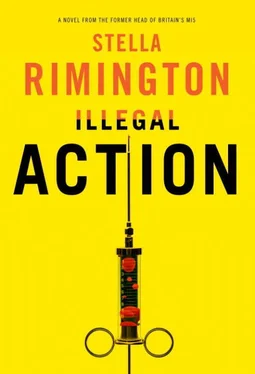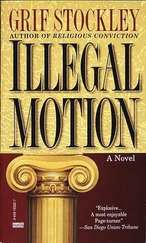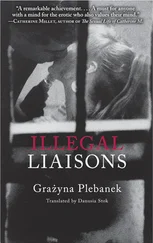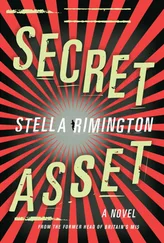Looking through the small window, Liz watched the Severn grow larger, then after a short time begin to shrink in the distance behind them. She thought about Brunovsky, trying yet again to get a fix on the man—difficult, since he was so volatile: one minute charm itself, the next volcanically bad-tempered. The deference he’d shown her at first had slowly diminished as she had become a familiar in his household. He obviously had some kind of confidence in her and had listened to her warning like a little boy being told what was good for him, but increasingly he was treating her as his property, in the same peremptory, demanding fashion he treated Monica or, God help us, the hapless Tamara. Another three weeks in Belgravia, thought Liz, and he’d have me taking dictation.
She undid her seat belt and walked back to the galley in search of some water, passing Jerry Simmons in his blue chauffeur’s suit. There would have been something imposing about his gorilla shoulders and big, bland face, had he not been sound asleep, snoring softly with his mouth open.
As they reached the eastern tip of Ireland the cloud thickened and the view disappeared. The plane descended slowly and bumpily until suddenly, only a few hundred feet above land, a gentle, rolling landscape of silky green appeared like a watercolour below. Liz could make out small farms, a hamlet of six or seven cottages, a stream no bigger than a large ditch, and then the wheels gently touched the runway with a delicate kiss.
A jubilant roar came from the cockpit, and as the plane rolled slowly towards the tiny terminal in the distance, Brunovsky emerged with a grin on his face. “I have not lost my touch,” he declared happily as he rejoined Liz, who was taking her mobile out of her bag. As she turned it on, Brunovsky reached out a large hand. “Could I borrow that for a moment?” he asked. “I left mine behind, and Monica likes to know when I have landed.”
Liz was extremely reluctant to surrender her phone, since it held a battery of Thames House numbers, but with Brunovsky’s hand held out, it was difficult to refuse to lend it to him. He took the phone and went back to the cockpit as the plane continued to traverse the long cross-axis of runway.
At last the plane came to a stop outside the terminal, and the pilot pushed open the cabin door, then unfolded the steel stairway. As Liz and Brunovsky came down the steps, with Simmons behind them, a chill westerly wind that had not yet reached London swept across the tarmac, catching them as they walked quickly to the tiny new terminal building of tinted glass and charcoal steel. There was a Boeing 737 parked outside the far end of the building, and a line of Cessna propeller planes on the grass fringe by the airport fence, but otherwise no sign of traffic.
Inside the terminal, landing formalities were cursory. A cheerful young man in a uniform gave a quick look at their passports and waved them through. Baggageless, they moved past an unattended customs desk into a small outer hall, where a solitary girl sat doing nothing behind a desk. Liz thought she had better let Peggy know where she was. “Can I have my phone please?” she asked Brunovsky.
“Of course,” he said, and felt in his jacket pocket. He tried another pocket, then patted all of them with an anxious look on his face. “Oh no,” he said, “I’ve left it in the cockpit.”
“I’m sure I can go back and get it,” said Liz. She couldn’t believe the man at passport control would object.
Brunovsky shook his head. “I am so sorry, Jane, but the plane won’t be there. The pilot’s taken it for refuelling.” He looked at her apologetically.
“There must be a pay phone here.”
Brunovsky looked irritated. “Jane, we are late already. Please wait. We will be at the house in half an hour—you can ring from there.”
Y our call is being forwarded to the voicemail service…
Peggy had already sent a text message—RETURN TO LONDON URGENTLY. RING ASAP—and had phoned half a dozen times to no avail. What had Liz said in her message? I’m going to Ireland with Brunovsky in his private jet to see this new picture that’s turned up. We’ll be back this evening but I’ll ring again when we get there to let you know where we are. But no call had come, so where were they?
Normally, this was just the sort of problem Peggy enjoyed solving but she wasn’t enjoying herself now. The possibility that Liz was in danger was making her heart thump uncomfortably as she worked. She began by checking back through all Liz’s reports to see if there was any mention of the location of this supposed new picture, but all Liz had said was that it was owned by a Miss Cottingham who lived near Cork. Peggy had great faith in the Internet as a starting point for puzzles and she was pretty sure that she would be able to find Liz within a few minutes. Googling “Cottingham + Ireland” produced only the useless information that Lewis Cottingham was the architect of Armagh Cathedral. Liz had said the old lady owned a large country house, but a trawl through landowners and tourist sites turned up nothing useful. The Irish telephone directory listed only four Cottinghams in the entire country—three in Dublin and one in Belfast, none of them obvious owners of large country houses, none of them likely candidates for the perpetration of an art fraud.
Airports next, thought Peggy, trying to keep calm. Where would a small plane land? They were heading for somewhere near Cork, so probably Cork airport. But it could be Kerry. Or even Shannon—if they had a helicopter standing by they could reach almost any point in southwest Ireland within half an hour. There were thirty-six airports in Ireland and even when she had discounted the twenty-one with unpaved runways, that still left fifteen possibilities.
At this point Peggy telephoned the office of the Garda Siochana in Cork and found herself speaking to a soft-spoken man named O’Farrell, head of Special Branch. She told him that she needed urgently to contact a colleague who was on her way to visit a country house somewhere in the county, owned by an old lady. “I don’t know the name of the place, and was hoping you could help.”
O’Farrell gave a gentle laugh. “Ireland’s full of old country houses inhabited by almost equally old ladies.”
“I’ve got the owner’s name,” she said eagerly. “It’s Cottingham—a Miss Cottingham. But I can’t find her in any directory.”
“The name doesn’t ring a bell, but then, I’m not a student of the Irish gentry. Let me ask around. I’ll get back to you.”
What next? thought Peggy, drawing what felt like her first breath for half an hour. “When in doubt,” her Anglo-Saxon tutor at Oxford had once told her, finding her half in tears when stuck with a particularly tricky passage in Beowulf , “the answer is to move on.” So now Peggy did.
The news in the message from the Danes that she had shown to Brian, that Greta Darnshof was not who she claimed to be, would in other circumstances have thrilled Peggy. Now it frightened her. The Danes had run Greta Darnshof’s name against a programme intended to help expose identity theft and they’d hit the jackpot. At first the search had come up negative—the Danes had focused on 1964 when Greta claimed to have been born, and 1965. But when they widened the search they found Greta Darnshof, a five-year-old girl, died with her mother and father in a car crash in 1969, thirty kilometres from the town of Horsens. About six years ago someone else had assumed her identity and three years later, the new Darnshof had moved to Norway. Herr Beckendorf was convinced this was his Illegal and now she was living in London, dead thirty-eight years yet miraculously reborn as the editor of Private Collection. Neither the Danes, the Germans nor Peggy knew what her mission was, but it was looking increasingly likely that it had something to do with Brunovsky.
Читать дальше












